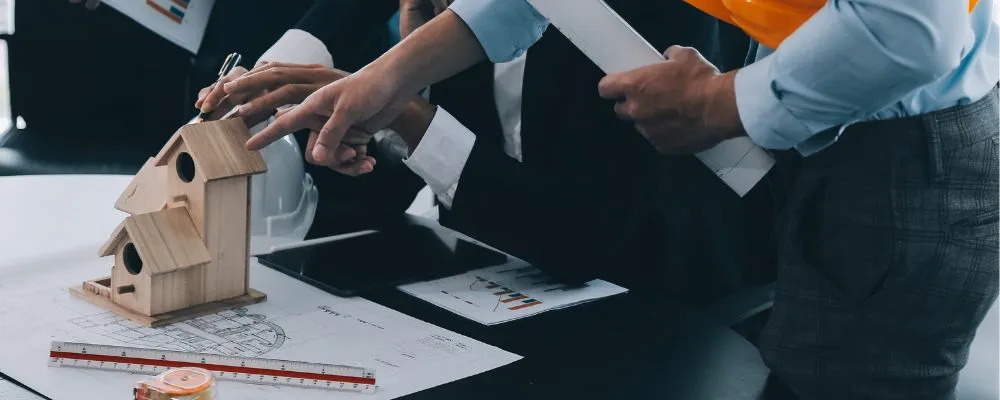It’s important to get the right financing, whether you want to build your dream home, fix up an existing one, or start a commercial construction project. A lot of money must be put down at the start of a construction project. Finding the right financing choices can greatly affect how well the project goes and how much it costs. In this blog, Brick & Bolt will go over many types of construction loans, payment plans, and important things to consider to help you get through the complicated world of building financing.
What is a Construction Loan or Construction Financing?
A construction loan, also called construction financing, is a special kind of loan used only to build large, new homes or businesses. It provides the money needed for the building process’s costs, such as materials, labour, and other related costs.
Construction loans offer a unique level of security compared to regular mortgage loans. The funds are disbursed in stages, aligning with the project’s progression. This ensures that you don’t receive the entire loan amount at once, and you only pay interest on the funds you’ve received. This structure provides a reassuring safety net, allowing you to manage your finances more effectively during the construction process.
Types of Construction Financing Loans
There are different kinds of construction financing loans that people can get, and each one is made to fit a different set of wants and project requirements. Here are the main types of loans used to pay for building projects:
1. Construction-to-Permanent Loans
Construction-to-permanent loans, also known as ‘All-in-one’ loans, simplify the financing process. These loans combine the construction loan and mortgage into a single loan, streamlining your financial obligations. During the construction phase, you’ll only pay interest on the disbursed funds. Once the project is complete, the loan seamlessly transitions into a permanent mortgage, typically with a fixed interest rate for the remaining term. This understanding empowers you to make informed decisions about your construction financing.
2. Stand-Alone Construction Loans
A stand-alone construction loan is a short-term way to pay for things while the building is being done. When the project is done, you’ll need to either get a new mortgage or turn the building loan into a permanent mortgage. The interest rates on these loans often change, and you may have to pay extra fees or a bigger down payment.
3. Renovation Loans
Residents can pay for big changes or improvements they want to make to their homes with a renovation loan. You can get one of these loans alone or with a mortgage swap. This way, people can get the money they need for home improvements while getting a lower interest rate on their current mortgage.
4. Commercial Construction Loans
Commercial construction loans can be used for bigger business projects like office buildings, stores, or apartment buildings with more than one unit. These loans usually have stricter standards for who can get them, higher down payments, and more collateral needs to be provided.
Financing Options for Construction Projects

There are a few different ways to finance construction projects, each with pros and cons. Here are some of the most common ways to get money for building projects:
1. Traditional Bank Loans
A traditional bank loan is given by a commercial bank or other financial company to a person or a business for various reasons, such as to pay for a building project, buy property, grow their business, or meet other financial needs. When someone gets one of these loans, they usually get a lump sum of money upfront and pay it back over time with interest, as decided upon by the bank. Traditional bank loans usually need security and a careful look at the borrower’s credit history, finances, and loan repayment ability.
2. Private Lenders
Private lenders, such as hard money lenders or private equity firms, can offer construction loans, especially to people who might not be able to get a loan from a bank. These lenders might be less picky about who can take money from them, but they might charge more fees and interest.
3. Government-Backed Loans
Some government-backed loan programs, like those run by the Federal Housing Administration (FHA) or the Department of Veterans Affairs (VA), can help eligible borrowers finance building projects with good terms and low down payments.
4. Owner Financing
Property owners may offer owner financing, acting as the lender and giving the money for the building project. This deal can be good for people who can’t get traditional loans, but it should be carefully thought through and made official with legal paperwork.
What are the Requirements for Construction Loan?
While each lender may have different standards, here are some things that most lenders look at when they receive construction loan applications:
- He/She should be an Indian citizen.
- To lower their risk, lenders usually require a large down payment, usually between 20% and 30% of the total project cost.
- At least three years of work experience for salaried applicants and five years of running a business for self-employed candidates.
- A good credit score is important because it shows you are creditworthy and can repay the loan. Lenders might have basic credit score needs.
- Lenders will examine the ratio of debt to income to ensure that you have enough income to pay back the loan and your other debts.
- You’ll need to show specific building plans, contractor licenses, and cost estimates from trusted contractors.
- Lenders may need more than just the property being built as collateral for the loan. This could include assets or properties that are already owned.
Construction Loan Interest Rates
Interest rates on construction loans can differ based on the lender, the loan type, the project details, and your credit score. Because lenders take on more risk with building loans, the interest rates are usually higher than regular mortgages. Interest rates can be set or change over time, and during the construction phase, some lenders may let you pay only the interest.
Payment Plans and Budgeting
Planning your budget and payments carefully is very important for smooth construction projects. Lenders will look closely at how well you can handle your cash flow, make timely loan payments, and cover surprise costs. You should work together with your lender, contractor, and financial advisor to make a sensible budget and payment plan that considers things like delays, cost overruns, and other possibilities.
Finally, one important thing you should do to make your construction project happen is to look into your construction financing options. If you know the different types of loans, where you can get money, and what lenders want, you can make smart choices and get the best loan for your construction. It is advisable to keep this idea (Taking home construction loans) as a last option. Try to explore the options that availaable in market to own a home without loan. To ensure your construction goes smoothly and successfully, don’t forget to carefully think about your budget, the scope of the job, and your long-term goals.
To learn more about home loans, click the link below.

